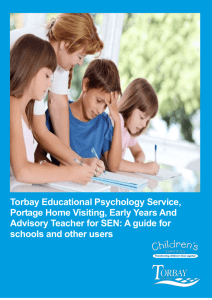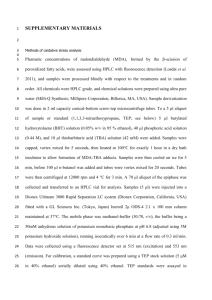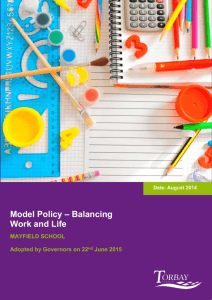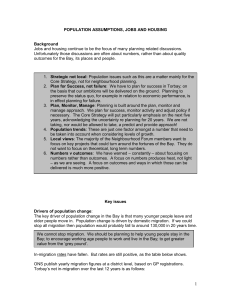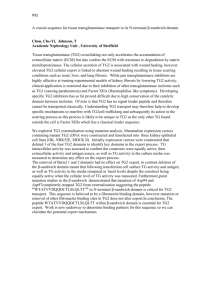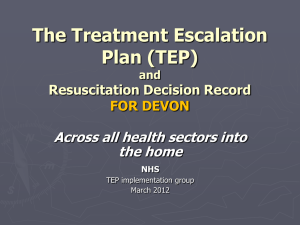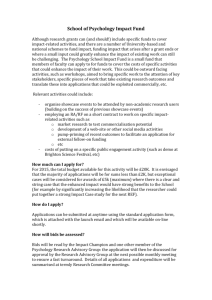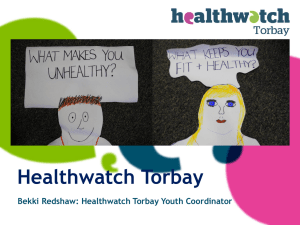Torbay Educational Psychology Service, Portage
advertisement
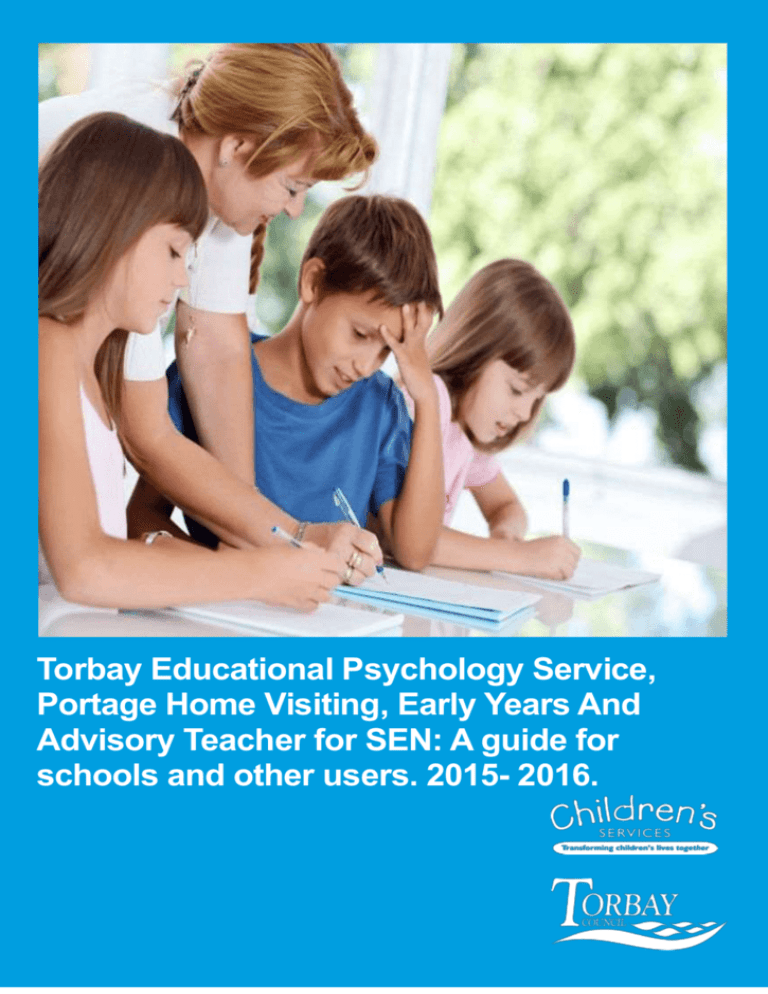
Torbay Educational Psychology Service, Portage Home Visiting, Early Years And Advisory Teacher for SEN: A guide for schools and other users. 2015- 2016. Contents Contents ..................................................................................................................................... 2 The Educational Psychology Service: who we are ................................................................. 3 What are the general aims of the Educational Psychology Service? .................................... 3 Statutory work, Core work and Traded Services: an overview .............................................. 4 Statutory work for the Educational Psychology Service ........................................................ 4 Advisory teacher - Traded Services ......................................................................................... 4 Statutory work for the Advisory Teacher for Special Educational Needs ............................. 5 Core work ................................................................................................................................... 5 Educational Psychology - Traded Services ............................................................................. 5 How to make best use of your traded service ......................................................................... 5 Checklist for a visit .................................................................................................................... 6 Service Standards ...................................................................................................................... 7 Communication and correspondence ...................................................................................... 7 Meetings and appointments ...................................................................................................... 7 Specific Service standards ....................................................................................................... 7 Portage home visiting................................................................................................................ 7 Portage service: who we are ..................................................................................................... 8 How to make a referral for Portage .......................................................................................... 8 Advisory Teacher for Early years ............................................................................................. 8 How to make a referral for early years advisory teacher ........................................................ 8 Frequently asked questions...................................................................................................... 9 Can I talk about a child without gaining parental permission? ................................................................................. 9 What is the role of Torbay’s EP/TEP regarding children and young people living in a neighbouring authority but attending a Torbay school? ...................................................................................................................................... 9 What if a child with a Statement/EHC Plan moves from another LA to live in Torbay? ........................................... 9 Do parents have direct access to EPs/TEP? ............................................................................................................ 9 What if a parent contacts the EP/TEP directly, seeking an assessment? ................................................................ 9 Who will see EP/TEP’s report? ................................................................................................................................. 9 What if an EP/TEP visit is cancelled by the school? ..............................................................................................10 What is the EP/ TEP’s role with regard to the special examination arrangements? ..............................................10 Appendix A- Guidelines for schools on EP/TEP/Advisory Teacher time required for specific activities ..................................................................................................................... 10 Appendix B- Service Request Form with suggestions for completion. .............................. 12 2 | Torbay Council About this guide Torbay Educational Psychology Service (EPS), Portage home visiting, early years and the Advisory Teacher for Special Educational Needs trade services with schools, nurseries and other users. This booklet outlines what these service users can expect from them and gives examples about the best way to use these services. The Educational Psychology Service: who we are The EPS consists of fully qualified Educational Psychologists (EP’s), a Trainee Educational Psychologist (TEP) and business support. We also engage the services of a Consultant Educational Psychologist to provide clinical supervision and support casework. In the past we have also employed Assistant Educational Psychologists, who are psychology graduates who hope to go on to train as Educational Psychologists. We also have supported interns who are psychology undergraduates gaining work experience within the service. Currently the Service consists of: Lorraine O’Callaghan (Educational Psychologist) Alex Ashraf (Educational Psychologist) Debbie Mansfield (Educational Psychologist) Vicky Wright (Educational Psychologist) Hannah Norman (Educational Psychologist) Vanessa Rowe (Educational Psychologist) Nigel Harrisson (Consultant Educational Psychologist) Kavita Solder (Trainee Educational Psychologist) Stacey Moates (Business Support) Paul Williams (Senior Educational Psychologist) Hannah Weaver (Educational Psychology Intern) The service is managed by Dorothy Hadleigh. All our Educational Psychologists are registered with the Health and Care Professionals Council (HCPC). What are the general aims of the Educational Psychology Service? The EPS provides a range of specialist psychological services designed to promote and support inclusive education in Torbay schools. Our aims are to support schools in developing their own capacity to increase standards of achievement for all, but particularly those children and young people who have, or may develop, special educational needs (SEN). This is achieved through work with individual children, their families, school staff and other agencies. We also work in partnership with schools to improve their wider practice in meeting the children’s needs at a group or whole school level. Torbay Council | 3 Statutory work, Core work and Traded Services: an overview We divide our work into three categories: Statutory, Core and Traded Services. Statutory and Core work is paid for by the Local Authority, Traded Services work is bought by the school. The following sections outline these different areas of work. Statutory work for the Educational Psychology Service The EPS is a statutory service (a service that Torbay Local Authority must provide). The statutory duty of the service is to support the Local Authority to implement the Special Educational Needs and Disability Code of Practice. It is important for schools and other service users to understand that this duty, which may be initiated by a school, is not directed by the school, it is directed by the Local Authority. For example, a school may suggest that a child’s Education, Health and Care Plan no longer reflects the child or young person’s needs and they may require further Educational Psychology involvement. The school would then ask the Local Authority, through the Annual Review, for further Educational Psychology involvement. It would then be the Local Authority’s decision whether or not to instruct the EPS to carry out this work. Note that assessing a child before a Request for Statutory Assessment (RSA) is not statutory work for the school’s Educational Psychologist; it will come from the school’s traded services allocation. Where a Devon child is in a Torbay school there is the expectation that a Devon Psychologist would complete any statutory work (see FAQs for more information). Statutory work would typically involve: Providing psychological advice which contributes to the Statutory Assessment of a Torbay child or young person’s SEN (0-25 years). Support for Torbay’s special schools within their time allocation. Directed by the Local Authority’s SEN team, the EPS may also: Provide advice on meeting a child or young person’s ongoing SEN. Provide assessments and reports for Annual Review meetings. Attend Annual Review meetings. Undertake assessment of young people over sixteen years of age in further education. Advisory teacher - Traded Services The Advisory Teacher for SEN is Gill Hague. In addition to her statutory and core duties, Gill can also offer a traded service to support and advise schools in relation to SEN. Previously, this role was known as ‘Link Professional’. These additional services could include, but are not limited to: Training. Assessment of individual children and young people; especially around literacy and numeracy. Observation and advice around the needs of children and young people. Support for members of staff, including the mentoring of SENCOs new to the role. 4 | Torbay Council Advice around classroom practice including intervention to support different aspects of learning. Staff surgeries. Statutory work for the Advisory Teacher for Special Educational Needs The Local Authority also has a duty to promote high standards of education for children and young people with SEN. Specifically, the Local Authority must provide support for schools with regard to making provision for children and young people with SEN and monitoring and reviewing the progress of these children and young people. The Advisory Teacher plays an important role in meeting these Local Authority duties through regular monitoring of Statements/Education, Health and Care Plans. Core work In addition to the statutory role, the EP/TEPs and the Advisory Teacher for SEN also undertake a range of activities to help Torbay Local Authority deliver its core functions, for example we: Provide advice and support to Early Years Settings. Undertake assessments of children and young people in non-maintained settings (0-25 years). Monitor provisions to ensure achievement and value for money. Assist with strategic development of SEN within Torbay. Provide support for schools at times of crisis. Educational Psychology - Traded Services Any school setting can purchase additional Educational Psychology support in blocks of days to meet the school’s specific needs and priorities. This time may be used to support the following: Training. Assessment of individual children and young people. Consultation and reviews for children and young people whose progress or behaviour is causing concern. Direct intervention with individual children and young people, groups of children and young people and/or families. Staff surgeries. Parent drop-in sessions at school. Clearly as traded work is paid for and directed by the school, it is important that the time is used effectively and provides value for money for the school. The following section of this guide outlines how this might best be achieved. How to make best use of your traded service Torbay Council | 5 Each EP/TEP and the Advisory Teacher is allocated to a group of schools which they visit regularly as part of the traded services. Schools have bought this time in terms of days of work. Note: one day equals six hours. Half a day equals three hours. Time for preparation, administration and follow-up will be included within the purchased days. Please note that report writing is very time intensive and it is likely that the EP/TEP/Advisory Teacher will spend around 50% of the time allocated on this and other administrative tasks. Therefore a morning’s work in school will be at least a whole day’s allocation of time. Experience has shown that planning meetings are essential in order to make best use of time and prioritise work. A planning meeting will be arranged at the beginning of the school year and further planning meetings can be arranged as required. Planning meetings are useful for negotiating the type of work that could be carried out over the year, which could include: In-Service training. Work to improve the school’s systems for children and young people with learning, social, emotional or behavioural difficulties, including, possibly the use of funding for high incidence needs. Termly planning meetings to monitor and review progress. An end of year review to reflect on the year’s work and begin to identify new priorities for the next academic year. Consultation and intervention at individual and group levels. Observations and feedback on classroom management. Consultation reviews to review the progress of children and young people who have been the subject of an earlier consultation. Checklist for a visit As EP’s/TEP’s and Advisory Teacher’s time available to schools rarely seems enough, time spent beforehand clarifying what you want from the visit is time well spent. Have any relevant paperwork completed and sent to the EP/TEP/Advisory Teacher before the visit. The better briefed others are, (staff, children and young people or parents) the more effective the visit is likely to be. If it is not possible to be available when the EP/TEP/Advisory Teacher arrives, ensure someone on reception knows the EP/TEP/Advisory Teacher’s timetable. It is really helpful if you’re available at the end of the session. We will provide some verbal feedback and together we could check plans for the next visit. Space is very tight in most schools; however it is important to have suitable space available for any meetings or individual work with your children and young people. The space needs to be free from distraction and conducive to confidential conversations. If it is necessary to change the agreed plan, please let the EP/TEP/Advisory Teacher know before they arrive so they can be best prepared. Please be realistic when constructing a timetable. See appendix A for some further guidance. Your EP/TEP/Advisory Teacher will have a Torbay email address, although it may take a few days for them to be able to reply. If you want to contact your EP/TEP/Advisory Teacher by phone please leave a message if they are not in the office. If your call is urgent please make this clear. If you are not happy with any aspect of the service, please raise your concerns first with your EP/TEP/Advisory Teacher. If you are still not happy, please pass your concerns to Dorothy Hadleigh the service manager. 6 | Torbay Council Service Standards We will treat all service users with courtesy, honesty, integrity and discretion. We will treat all information provided to us as confidential. We will treat people fairly, embracing differences, respecting individuality and practising equality. We will provide a reliable service. Communication and correspondence We will give a clear response to your requests in a timely manner. We will maintain a tone of communication, written or spoken, that is helpful, polite, welcoming, responsive, respectful and inclusive. We will answer your telephone calls quickly in a welcoming, positive manner. If the person you wish to speak to is unavailable, we will try to sort out the query or take a message. When you write to us by letter or email we aim to reply within 10 working days. Meetings and appointments We will arrive in time for meetings and appointments. In the exceptional instance when late arrival is unavoidable we will telephone the school as soon as possible and give an anticipated arrival time. If we are unable to attend a pre-arranged meeting or appointment, we will contact the school to advise you as soon as possible. Specific Service standards Direct EP/TEP involvement with an individual child or young person will only take place once signed parental/carer consent has been given. Each EP/TEP works within the professional standards required by the Health and Care Professionals Council (HCPC). Portage home visiting Portage is a home visiting educational service for pre-school children with additional support needs and their families. We offer a framework of support with regular home visits, generally weekly or fortnightly, by a trained Portage Home Visitor. Parents share with the home visitor their understanding of their child’s individual gifts, abilities and support needs. Profiles or developmental checklists may help with this process of identifying strengths and goals for future learning when Portage visits begin. A Portage home visitor will stay for about an hour and in that time they will have spent time on structured activities and time for some free play, they will also spend some time with the family discussing the child’s achievements, appointments that are coming up or future targets. The aim of each home visit is to decide on an activity which the family can practice and enjoy together. The activities are based on play, grounded in everyday situations to provide fun and success for the child. Torbay Council | 7 The Home Visitor can help when the child starts nursery or school by meeting regularly with the staff and other professionals and sharing the child’s abilities and support needs. The will also liaise with other professionals to make sure everyone is working towards the same goals. The home visitor will make learning fun through play so that the child meets their full potential. Portage service: who we are The Portage team is made up of: Mandy Astin Donna Mepsted Veronica Dowell Carolyn Brend How to make a referral for Portage Referrals usually come from; Health visitors Pediatricians Child development centre Nurseries Parents can self refer Once a referral form is completed it then goes to a panel and a decision is made on the best services for the child. Advisory Teacher for Early years The Advisory Teacher for Early Years Inclusion supports all practitioners and Special Educational Needs Co-ordinators (SENCOs) working with children with special educational needs and/or disabilities in Early Years settings in Torbay. Inclusion support takes the form of training, advice and guidance around individual children’s needs and inclusive practices. The Advisory Teacher for Early Years is Judith Thomas. How to make a referral for early years advisory teacher The service can be accessed by completing a Referral Form with parent/carer consent. Referrals can be made by any practitioner involved with the child. Once a referral has been received the early years setting will be contacted and a visit will be arranged to meet with parents/carers, the child and practitioners. 8 | Torbay Council Early Years settings are invited to apply for funding to help support individual children with needs who have been referred to the service by completing the Funding for Support form which can be found on the Torbay council website. Frequently asked questions Can I talk about a child without gaining parental permission? We work within a framework of informed consent and it is very important that parental permission is sought before we discuss individual children. However, we would have the expectation that the SENCO has explained this to parents and agreed that discussion with the school’s EP or TEP may be appropriate. It is assumed therefore that in planning meetings, verbal consent has been received by the school. It should be emphasised that no individual work with any child or young person under 16 years of age can take place without the written permission of the child or young person’s parent or carer. What is the role of Torbay’s EP/TEP regarding children and young people living in a neighbouring authority but attending a Torbay school? Ongoing advice and support is available from the school’s EP/TEP for all children with additional needs in the school, including those who reside in neighbouring Local Authorities providing that they are not undergoing Statutory Assessment or already have an Education, Health and Care Plan. If the school or parent decides to request a Statutory Assessment, the request should be made to the SEN team of the Local Authority in which the child or young person is resident and it will be considered in relation to that Local Authority’s criteria. An EP from the Local Authority of residence will provide advice for Statutory Assessment usually liaising with the EP/TEP attached to the school. Requests by the school for EP/TEP attendance at Annual Reviews of Statements or Education, Health and Care Plans should be made to the Educational Psychology Service in the Local Authority of residence. What if a child with a Statement/EHC Plan moves from another LA to live in Torbay? The Torbay SEN team will be involved in the process. They will decide whether a reassessment is necessary and may ask the school to hold a review during the child or young person’s first term to aid this decision. Do parents have direct access to EPs/TEP? It is common practice for the EP/TEP to meet with parents at a child or young person’s school. The meeting is arranged through negotiation with the school’s SENCO. What if a parent contacts the EP/TEP directly, seeking an assessment? If a parent is seeking an assessment of their child, the EP/TEP will contact the school to discuss the parent’s concern and agree a way forward following the guidance contained in the SEN Code of Practice. If a parent makes direct contact with the EP/TEP and is seeking a Statutory Assessment, the request will be forwarded to the Local Authority’s SEN team, who will seek further information from the school before the request is considered. Who will see EP/TEP’s report? All reports written by Torbay’s EP/TEPs are routinely copied to parents and schools. Reports may be made available to other relevant professionals in line with information sharing guidance. Torbay Council | 9 What if an EP/TEP visit is cancelled by the school? Wherever possible it would be the intention of the link EP/TEP to reschedule a visit. However visits cancelled with less than two days notice may be difficult to reschedule since the EP/TEP will have less opportunity to re-allocate the session to other work. What is the EP/ TEP’s role with regard to the special examination arrangements? Schools may choose to use their traded EP/TEP time to support special examination arrangements. The EP/TEP may assist schools by: Submitting a report which includes a history of literacy difficulties. Contributing to school’s submission. Supporting an appropriately qualified teacher in completing an assessment. The EP/TEP may also support an appropriately qualified member of the school staff in completing an assessment for submission to the examination board. Appendix A- Guidelines for schools on EP/TEP/Advisory Teacher time required for specific activities The following provides approximate guidelines for schools about the amount of time EPs/TEPs may spend on some typical, specific activities. These are guidelines, they may vary according to particular circumstances, and could be spread over a number of visits. Activity Minimum Minutes Maximum minutes Initial discussion with teacher, SENCO, Head etc. to clarify problem for consultation and reason for EP/TEP involvement 15 30 Classroom observations 30 60 Meeting with parents 30 60 Consultation with staff 30 60 Individual counselling or therapy or family work 45 60 Sessions of group work (e.g. Anger Management; Circle of Friends) 45 60 Whole School Development Projects: Consultation, planning, delivery and evaluation Variable Variable 10 | Torbay Council Individual assessment work 45 120 Liaison with other professionals (inc. case conferences) 15 120 Specific INSET 60 (possible multiple sessions) Whole day Home visit 30 120 The EP/TEP and Advisory Teacher will spend at least 50% of the time allocated to schools on report writing and other administrative tasks. So a morning’s work in school will be matched by at least the same amount of time on school related activities. Torbay Council | 11 Appendix B- Service Request Form with suggestions for completion. EDUCATIONAL PSYCHOLOGY, PORTAGE HOME VISITING, EARLY SUPPORT AND ADVISORY TEACHING Service Request Form Please use this form if you feel a child/young person has additional needs which their current level of provision is not addressing. You are not required to complete the whole form to the same level of detail; concentrate on the presenting issues. Do not hesitate to follow established child protection procedures as soon as any requirement to do so is identified. Please attach copies of any assessments, records or observations that will help us to assess the needs of this child/young person. Service Request forms will be returned if there is insufficient information attached. All cases should be discussed with your Educational Psychologist/Advisory Teacher before referring to the Service. 1. Details of child or young person First Name(s): Surname: Previous/AKA: Date of Birth: Age: Lives with: Does this person have parentalYes: No: responsibility? If no, please state who does: Address (including postcode): Gender: Female: Parent/Carer Name: Male: Religion (if known): Telephone No: Mobile No: Address: (if different) School/College/Nursery: 12 | Torbay Council Year group: Nursery Sessions Attending: Child Protection Register? Yes: No: Looked after child? Yes: Disability: (Please describe the No: SEN School Support: Statement/EHC Plan: nature of disability – including any support that may be needed by parent/carers in completing any forms sent) Has there been, or is there any Yes: domestic abuse at home? No: Has there been, or is there Yes: No: currently involvement through If yes: the Early Support/ Social Care?Current: Past: 2. Ethnicity White British African Caribbean Pakistani Indian White & Black Caribbean White & Black African Chinese Any other ethnic group Any other White background Any other Black background Any other Asian background Any other mixed background Bangladeshi White & Asian If other, please specify: Immigration Status: Child’s first language: Parent(s) first language: Interpreter or signer required? Yes: No: White Irish Not Given Has this been arranged? Yes: No: Details of any special requirements (for child and/or their parents): 3. Referrer details Name: Position: School/Organisation/Agency: Address: Telephone No: E-mail: Have you seen this child/young person in connection with this service request? Yes: □ No: □ Have you seen the parent/carer in connection with this service request? Yes: □ No: □ 4. Family and environmental factors Please provide any relevant information related to parental support, family history, family structure (including siblings (and any additional needs they may have), other significant adults, etc). Please also provide details of any Social Care involvement. This section could be completed with the child’s parent/carer. The three main areas to report on are 1) Family, extended family and support given to the family; 2) The child’s development and health; 3) Past or continuing involvement of other agencies. A list of things that could be useful to include: Who lives with the child, if one parent does not live with the family does the child have regular contact. If the child is looked after and how long have they been with the foster family. Torbay Council | 13 If the child is a child in need or has other significant social care involvement. It is useful to include family history of difficulties e.g. child’s aunt is dyslexic or if a brother has had speech and language therapy and so on. Does the family receive Disability Living Allowance or other benefits relating to the needs of the child? Is there any involvement from other professionals to support the family, for example Family Support Worker, Social Worker, Attendance officer, Health visitor and so on. Have the family recently moved into the area or are due to move out of the area? Are any new siblings due to arrive? Does the child have a diagnosis of any sort? Did the child met early developmental milestones at age appropriate levels or was there an area of development that caused concerns? – Even if that area is now no longer a concern. Other referrals to health services. Has the child seen agencies outside of Torbay? Has the child attended or about to attend the Child Development Centre / Neurodevelopment Clinic or other specialist assessment? 5. Development of child or young person – main areas of concern Please insert number 1-5 as appropriate (1 = mild concern and 5 = extreme concern) General health _ Physical (including sensory) _ Cognitive _ Speech, language & communication _ Behaviour, emotional & social _ Participation in learning _ Progress & attainment in learning _ Self-care skills & independence _ Self-esteem _ Identity _ Peer relationships _ Please comment on any areas scored higher than 3: Please describe what is happening, where and when, how often and for how long, giving examples if possible. Is there anything else that may be influencing the current difficulties? Include any current medications or treatments. You can list your concerns using bullet points. You may wish to share the parents’ viewpoint in this section by commenting on the child’s areas of needs at home/’out and about’, as well as in the school or setting. 14 | Torbay Council Attainment Level: (EYFS or National Curriculum) For children in the Early years please comment on the 3 Prime Areas – Communication and Language; Personal, Emotional and Social; Physical Development. You can also make links to the child’s Early Years Developmental Journal Steps For school age children please comment on National Curriculum Assessments and any other assessment information that the school has completed. For example CATS, Spelling/ Reading tests. Any National Assessments such as SATs and GCSEs 6. Child or young person’s strengths / interests This section could include particular interests and achievements either in the school/ setting or outside of the school/ setting – this may include hobbies, sporting strengths, clubs or youth organisations, such as Brownies, Scouts, Church Groups, and so on. 7. Actions already taken to support child/young person Please give details of any strategies tried and whether they have been successful. Please attach IEP’s. You can bullet point the targets and strategies used to support the child. Torbay Council | 15 8. What would you like to happen as a result of making this referral? It is important to state who you would like to support you and your expectations about what will happen as a result of this referral, for example: ‘We would like advice and support from the Advisory Teacher for Early Years Inclusion’ ‘We would like an assessment from the Educational Psychologist as we will be requesting a statutory assessment for this child ‘ ‘We would like a visit from the Advisory Teacher to discuss strategies of support in the classroom’ Please attach the following documents if available: Assessments Reports Action Plans PEPs Other IEPs PSPs Observations Attainment data (e.g. Target Tracker profiles) (please specify) Signed.………………………………… (Referrer) Print Name………………………………………………………………… Date …………….. Please return this completed form together with the Agency list and signed Parental/Carer Consent Form to stacey.moates@torbay.gov.uk or: Stacey Moates Business Support Officer 4th Floor (South) Tor Hill House C/o Town Hall Torquay TQ1 3DR Please tick the services involved with this child/young person/family and provide the names and contact details of those involved. Please fill this in as much as you can with the parent’s support 16 | Torbay Council Agency/ Professional/ Organisation Contact Person Contact Details GP School nurse Health Visitor Counsellor CAMHS Paediatrician/Hospital Specialist Doctor Educational Psychologist Speech and Language Therapist Physiotherapist Occupational Therapist Portage John Parkes Unit Young Carers Social Care Parenting Services SureStart Targeted Youth Support YOT/Police Checkpoint Specialist Advisory Teacher / Consultant Pegasus Centre Outreach Services (please specify) Attendance Improvement Officer Other (please state) Torbay Council | 17 Parental / Carer Consent Child/Young Person……….…………………..………………………. Date of Birth……..……...... School /Early Years Setting/Provision Attended: ... ………………………………………………………………………………. In order for us to provide the best possible service, we may need to undertake assessments and contact other professionals working with you and your family to share relevant information. Any information we are given will be kept confidential and will only be shared with other people when necessary. You will be kept informed of any progress and invited to take part in discussions. If you do not want us to contact or share information with a particular agency/professional, please advise the person referring your child. The only exception to this is if there are concerns about a child’s safety, when we have a duty under the Children Act (2004) to pass on our concerns to the appropriate authority. Signed……………………………………………………………....... Parent / Carer Print Name……………………………..................................... Date….................... Copies of this Referral Form can be made available in different formats. Please contact: stacey.moates@torbay.gov.uk or Stacey Moates, Business Support Officer, 4th Floor (South), Tor Hill House, C/o Town Hall, Torquay, TQ1 3DR. Telephone: 01803 208261 for further information. 18 | Torbay Council
